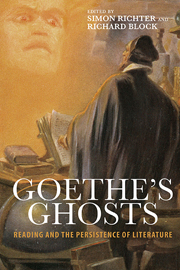Book contents
- Frontmatter
- Contents
- Introduction—Ghosts and the Machine: Reading with Jane Brown
- Part I The Ghosts of Goethe's Past
- 1 Egologies: Goethe, Entoptics, and the Instruments of Writing Life
- 2 Goethe's Haunted Architectural Idea
- 3 “Über allen Gipfeln”: The Poem as Hieroglyph
- 4 Goethe's Hauskapelle and Sacred Choral Music
- 5 From Haunting Visions to Revealing (Self-)Reflections: The Goethean Hero between Subject and Object
- Part II The Ghost That Keeps on Giving
- Part III Spirited Encounters
- Bibliography of Jane K. Brown's Publications
- Notes on the Contributors
- Index
4 - Goethe's Hauskapelle and Sacred Choral Music
from Part I - The Ghosts of Goethe's Past
Published online by Cambridge University Press: 05 March 2014
- Frontmatter
- Contents
- Introduction—Ghosts and the Machine: Reading with Jane Brown
- Part I The Ghosts of Goethe's Past
- 1 Egologies: Goethe, Entoptics, and the Instruments of Writing Life
- 2 Goethe's Haunted Architectural Idea
- 3 “Über allen Gipfeln”: The Poem as Hieroglyph
- 4 Goethe's Hauskapelle and Sacred Choral Music
- 5 From Haunting Visions to Revealing (Self-)Reflections: The Goethean Hero between Subject and Object
- Part II The Ghost That Keeps on Giving
- Part III Spirited Encounters
- Bibliography of Jane K. Brown's Publications
- Notes on the Contributors
- Index
Summary
In 1807 Goethe formed a small chamber choir in Weimar, which he referred to on occasion as his “Singschule” (singing school), “Singechor” (singing choir), or “Singstunden” (singing class); in his diary he would often simply write that he spent time with “die Sänger” (the singers). Thanking Bettine Brentano for a packet of music she had sent him, he called the choir “meine kleine Hauscapelle” (my little chamber group) in a 24 February 1808 letter to her, and with irony he called the choir “meine kompendiose Hauskapelle” (my compendious chamber group) in a 22 April 1814 letter to his friend and musical advisor Carl Friedrich Zelter (MA 20.1:343). Years later in the Tag- und Jahreshefte he once again and more seriously referred to it as his “Hauskapelle” as he recalled its most successful season, 1810-11.
That the name recalls an earlier Hauskapelle, which Goethe created in the fictive world of Wilhelm Meisters Lehrjahre, is not accidental:
Serlo, ohne selbst Genie zur Musik zu haben, oder irgend ein Instrument zu spielen, wußte ihren hohen Wert zu schätzen; er suchte sich so oft als möglich diesen Genuß, der mit keinem andern verglichen werden kann, zu verschaffen. Er hatte wöchentlich einmal Konzert, und nun hatte sich ihm durch Mignon, den Harfenspieler und Laertes, der auf der Violine nicht ungeschickt war, eine wunderliche kleine Hauskapelle gebildet.
(MA 5:282)- Type
- Chapter
- Information
- Goethe's GhostsReading and the Persistence of Literature, pp. 77 - 96Publisher: Boydell & BrewerPrint publication year: 2013



